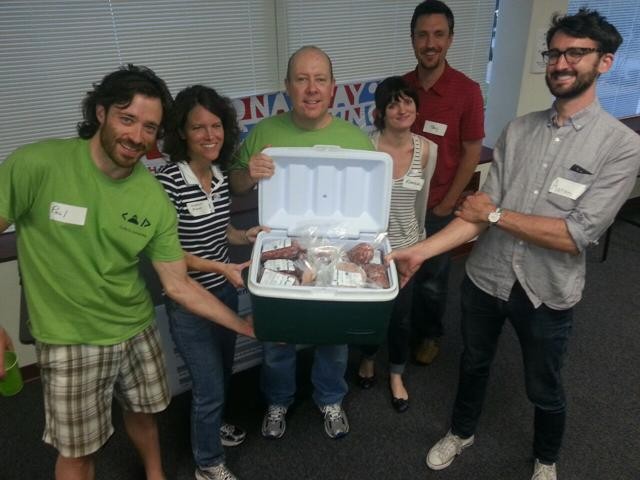What happens when you put local tech geeks and food aficionados in an A-B Tech classroom for 12 hours straight? Serious progress. That was the case, at least, when Asheville hosted a Hackathon as part of Code for America’s National Day of Civic Hacking on June 1.
Code for America is an organization whose goal is to bring technology and resources together to create open data and modernize government for the 21st century. Part of a nationwide event, the Saturday Hackathon was spearheaded by two members of CfA’s Asheville chapter: GIS Analyst Dave Michelson and Scott Barnwell, a GIS specialist for the city’s IT department. GIS is short for geographic interpretation system, which entails the analysis of data for use or display, usually through maps. Working closely with fellow “civic hacktivist” and Asheville-Buncombe Food Policy Council representative, David Abernathy, the trio coined the event “Hack for Food,” a friendly contest to create phone apps that would break down access barriers to food and support the FPC’s action plan, recently adopted by Asheville City Council.
Contrary to its name, a Hackathon actually has nothing to do with cyber espionage or sending lewd jokes from the principal’s office. Michelson explained to volunteers at A-B Tech that the term derives from World War II, when soldiers would gather fallen war planes, break them apart with hacksaws and reconstruct them to fly back into the fray.
“The idea is that you’re changing the way the government and people interact with Web technology,” says Michelson. “For technology people, there’s not always been a way to give back. … Technology has become such a significant part of people’s lives that now we can actually make a big impact. Cell phones are closing the access gap across all age groups and socioeconomic statuses.”
A Friday-night party held at Mojo Coworking downtown was kicked off by a welcome from City Council member Gordon Smith, drawing crowds of food activists, GIS experts, beekeepers and representatives from the Food Policy Council and nonprofit sector. Participants had 30 seconds to either discuss an issue or pitch an idea for a phone app. The following morning, four groups formed based on those pitches — with food experts providing the framework around the issues and the IT and mapping experts transforming those ideas into code.
One group, Farmersfeed.us, took its idea from the list of suggestions on the Hack for Change website. Troy Tolle, the founder and chief technology officer of the Asheville-based software company DigitalChalk, explains that their app is “a way for the public to be notified when certain vendors are at different farmers markets,” and has the potential to expand through Facebook, emails and customized notifications.
The Text for Food group focused on Asheville’s transportation system in the face of changing bus routes, as well as the emergence of mobile markets to “basically push communication and pull in what it is that the community needs,” says Kathryn Brewer, a GIS manager with the Metropolitan Sewage District. The group created a text-messaging network for coordinators to manage ride requests as well as updates on mobile market routes. Another project called LandLink is “connecting people who want to grow food with available land,” says Noah Wilson, Director of Grants at Advantage West. Whether it’s for subsistence production in an empty backyard or a retiring farmer who wants to sell land to a young buck, LandLink is a simple land-access app based on a similar model out of Portland, Ore., called Farmyard.com.
Finally, Team Community Dashboard built a program to let people track the metrics and progress of the Asheville-Buncombe Food Policy Council’s initiatives. It will be a communications tool for politicians and the public.
At the end of the 12 hours, each group presented their work to a panel of judges that scored them on a variety of benchmarks. The winning team, Farmersfeed.us, received 32 pounds of Warren Wilson beef and a shout-out from the USDA via Twitter.
In second place, Community Dashboard received boxes of organic vegetables donated by New Sprout Farms and third-place winner LandLink members were given a pound of coffee from Counter Culture Coffee. All the groups are eligible to submit their projects to the White House as part of a national showcase in July.
“The whole day exceeded everyone’s expectations,” says Barnwell, who is eager to bring the energy from the event to their next meeting on June 20. Barnwell is particularly interested in developing the Text for Food project, citing it as an important tool for the Asheville community. “Forward momentum [on the projects] will be facilitated by [our group], but depends on continued engagement from the Hackathon volunteers,” he explains.
For more information about volunteering, you can visit codeforasheville.org.
— Rachel Winner is an Asheville-based freelance writer.






Before you comment
The comments section is here to provide a platform for civil dialogue on the issues we face together as a local community. Xpress is committed to offering this platform for all voices, but when the tone of the discussion gets nasty or strays off topic, we believe many people choose not to participate. Xpress editors are determined to moderate comments to ensure a constructive interchange is maintained. All comments judged not to be in keeping with the spirit of civil discourse will be removed and repeat violators will be banned. See here for our terms of service. Thank you for being part of this effort to promote respectful discussion.